マグリットの『不許複製』の中のポーの『ピム』の複製 Reproduction of Poe's _Pym_ in Magritte's _La Reproduction interdite [Not to Be Reproduced]_(1937) [ポー Edgar Allan Poe]
ポーについてチョコチョコ書いていこうかな、と思いました。
チョコといえばベルギー生まれのフランスのシュルレアリスムの画家ルネ・マグリット René Magritte, 1898-1967――長い名前はルネ・フランソワ・ギスラン・マグリット René François Ghislain Magritte――はポーに私淑していて、ポーの同名の短篇と響きあう『アルンハイムの領地』の連作が有名ですけれど・・・・・・あるいはもうちょっと一般化するなら、ポーがもっているシュルレアル(超現実的)な特質を絵画化したんだ、と言ったらマグリット自身はうなずいたかもしれないのですけれど・・・・・・、いちおう明瞭にレファレンスのある作品をひとつ。
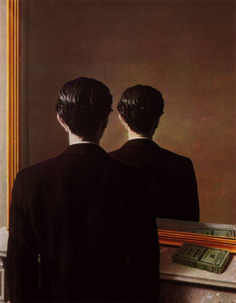
La Reproduction interdite [Not to Be Reproduced] 『不許複製』 (1937)
oil on canvas, 81.3cm × 65.0cm (32in × 26in) オランダ、ロッテルダムのボイマンス・ヴァン・ベーニンゲン美術館 (Museum Boijmans Van Beuningen) 蔵 大きい絵at picasa
ウィキペディアのファイルにはなぜか File:Portrait of Edward James <http://en.wikipedia.org/wiki/File:Portrait_of_Edward_James.jpg>として入っていて、誰かさんが、"This is not Portrait of Edward James, it is La Reproduction Interdite (English: Not to be Reproduced)." と書き込んでいますけれど、顔を見せない絵の中の人物は、シュルレアリスムのパトロンとして有名なエドワード・ジェイムズ Edward James, 1907-84 だと言われています。エドワード・ジェイムズは、アメリカの鉄道王のひとりだったウィリアム・ジェイムズ(ヘンリー・ジェイムズの兄さんの心理学者とはもちろん別人)の息子で、父親はイギリスに移ってきて結婚して女の子を4人もうけたののちにエドワードが生まれ、でも幼いころに亡くなってしまいます。そしてエドワードは莫大な遺産相続人となったのでした。オクスフォード大学では作家のイーヴリン・ウォーと同窓で、彼自身も詩人となりました。
鏡像とかダブルとか、影のあるようでない男とか、顔の見えない男とか、ポー的ゴシック小説と響きあうのかのもかもしれませんけれど、もっと即物的に、絵の右側、こちらは鏡像をちゃんと映している、本。
詩人シャルル・ボードレールが19世紀中葉に訳したポーのまあ唯一の長篇小説『アーサー・ゴードン・ピムの冒険』Edgar Poe, Aventures d'Arthur Gordon Pym, trans. Charles Baudelaire です。
/////////////////////////////////////////////
"Surrealism" EyeconArt <http://www.robinurton.com/history/surrealism.htm> 〔このページが絵のタイトルを "Portrait of Edward James" にしているのでWikipedia で混乱が起こっています〕
Trans. Charles Baudelaire. Aventures d'Arthur Gordon Pym par Edgar Poe. [1858] Nouvelle édition. Paris: Michel Lévy, 1868. <http://www.archive.org/stream/aventuresdarthu00poegoog#page/n6/mode/2up>
Trans. Charles Baudelaire. Edgar Poe, Adventures d'Arthur Gordon Pym / Eureka. Vol. VII of OEuvres Complètes de Charles Baudelaire. Paris: Calmann-Lévy, n.d. 280pp. <http://www.archive.org/stream/aventuresdarthur00poee#page/n5/mode/2up>
Trans. Charles Baudelaire. Edgar Poe, Adventures d'Arthur Gordon Pym de Nantucket. OEuvres Complètes de Charles Baudelaire. Notice, notes et éclaircissements de Jacques Crépet. Paris: Louis Conard, 1934. ix+324pp. <http://www.archive.org/stream/aventuresdarthu00poee#page/n5/mode/2up>
"Les Adventures d'Arthur Gordon Pym" Wikipedia (French) <http://fr.wikipedia.org/wiki/Les_Aventures_d%27Arthur_Gordon_Pym> 〔マリ・ボナパルトの精神分析的解釈から現象学的批評のガストン・バシュラール、そしてヌーヴォー・ロマンの理論家だったジャン・リカルドゥーと、なるほどフランスと親近性のあるポーの著作らしく、英語のウィキペディアの記事"The Narrative of Arthur Gordon Pym of Nantucket" <http://en.wikipedia.org/wiki/The_Narrative_of_Arthur_Gordon_Pym_of_Nantucket>とはちょっとちがったかたちで充実した内容なのでした〕
マネのポー Manet's Studies of Poe [ポー Edgar Allan Poe]
フランスの印象派の走り的だけど自然主義的リアリズムの画家のエドゥアール・マネ Édouard Manet, 1832-83 は、ステファヌ・マラルメによるポーの「大ガラス The Raven [Le Corbeau]」の訳詩集に挿画を描いた関係もあって、推定1870年代に3枚ポーの肖像デッサンを残しているようです。
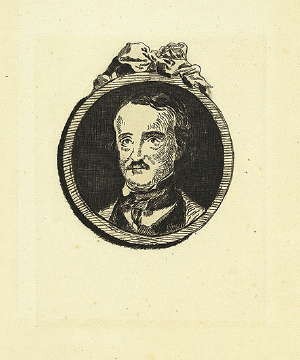
Edouard Manet, Edgar Poe. Etching printed in dark brownish-black on cream laid paper, 1860. 7 5/8 inches by 6 1/8 inches, full margins. Estimate $1,000-$1,500. image via AntiqueTrader
2枚目――
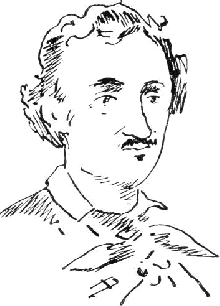
image: Hexengeschichten plattenbauromantik <http://hegewald.wordpress.com/category/hexengeschichten/>
この角度で載せているページが他にもありますが、もちっとそっくりかえっていたようです。――
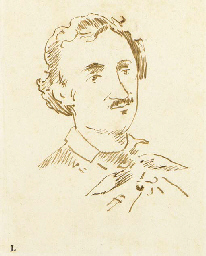
Edouard Manet, Portrait d'Edgar Allan Poe
pen and brown ink on paper
Image size: 4¾ x 3 5/8 in. (12.1 x 9.3 cm.)
image via Christie's <http://www.christies.com/LotFinder/lot_details.aspx?intObjectID=3807379>
下のは、この絵を使った本の校正刷りにマネが署名したものだそうです。――
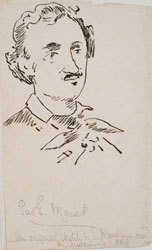
"Artist Edouard Manet signed this proof of an illustration he drew to accompany a 19th-century translation of Poe’s work into French. " image "Shedding Light on a Shadowy Figure | The University of Virginia Magazine" [Spring 2009]<http://uvamagazine.org/features/article/shedding_light_on_a_shadow_figure/>
ふんぞりかえらない角度だと、つぎのダゲレオタイプ(William Pratt というひとが撮影した "Thompson daguerreotype" と呼ばれるポー最晩年の肖像)がもともとかな、と思われるのですが(だって、「モデル」のポーは1849年に死んじゃっていますから)。――
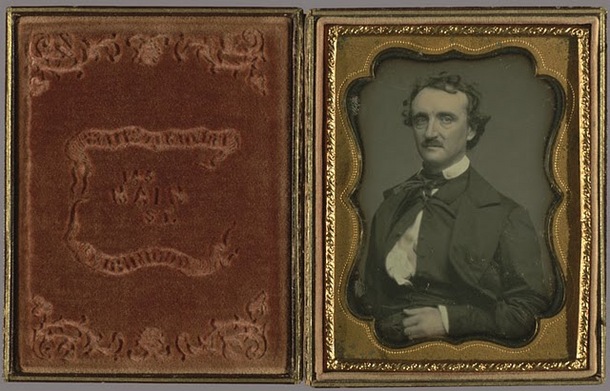
image: "Edgar Allan Poe, Richmond, Sept. 1849 - Daguerreotype by William Abbot Pratt." [2010.11.18] The Shockoe Examiner: Blogging the History of Richmond-in-Virginia <http://theshockoeexaminer.blogspot.com/2010/11/edgar-allen-poe-richmond-sept-1849.html>
暮れだったか新年だったかにボルティモアのポー協会のホームページ内に Michael J. Deas, The Portraits and Daguerreotypes of Edgar Allan Poe (1989)がおさめられました。そのなかの "The “Thompson” Daguerreotype" <http://www.eapoe.org/papers/misc1921/deas111a.htm>、それとウィリアム・プラットのダゲレオタイプを親として派生したポートレトたち "EARLY DERIVATIVES OF THE DAGUERREOTYPES BY WILLIAM PRATT" <http://www.eapoe.org/papers/misc1921/deas202a.htm>
ダゲレオタイプ(銀板写真)は左右反転する(鏡像になる)ので、もう一回左右を逆にすることは自然だったわけです。たぶん。
もう1葉は捜索中。
///////////////////////////////////////
ステファヌ・マラルメ訳、エドゥアール・マネ画 エドガー・ポー『大ガラス』
Le Corbeau (traduit par Stephane Mallarme) - Wikisource <http://fr.wikisource.org/wiki/Le_Corbeau_(traduit_par_St%C3%A9phane_Mallarm%C3%A9)> 〔仏訳のみ〕
The Project Gutenberg eBook of Le Corbeau / the Raven, by Edgar Poe, 1875 <http://ia700407.us.archive.org/35/items/lecorbeau14082gut/14082-h/14082-h.htm> 〔英仏対照〕
天体の音楽 (1) Music of the Spheres [ポー Edgar Allan Poe]
ポーのエッセイ集『マルジナリア』のシリーズの239番(『サザン・リテラリー・メッセンジャー』誌1849年6月号336-337ページ)は、ピタゴラスに由来するといわれる「天体の音楽」(「天球の音楽」、ジョスリン・ゴドウィンの本の邦訳題だと「星界の音楽」)についての覚書です――
The phrase of which our poets, and more especially our orators, are so fond—the phrase “music of the spheres”—has arisen simply from a misconception of the Platonic word μουσικη—which, with the Athenians, included not merely the harmonies of tune and time, but proportion generally. In recommending the study of “music” as “the best education for the soul,” Plato referred to the cultivation of the Taste, in contradistinction from that of the Pure Reason. By the “music of the spheres” is meant the agreements —the adaptations—in a word, the proportions—developed in the astronomical laws. He had no allusion to music in our understanding of the term. The word “mosaic,” which we derive from μουσικη, refers, in like manner, to the proportion, or harmony of color, observed—or which should be observed—in the department of Art so entitled.
(アメリカの詩人、そしてことに雄弁家が好んで使う「天体の音楽」というフレーズは、プラトン的な用語ムウジケの誤解からおこったものである。アテナイ人はこの言葉を、節(曲)と時(テンポ)の調和だけでなく、一般に釣り合いの意味に使っていた。だからプラトンが、「魂の最上の教育」として music を学ぶことを薦めたとき、彼は<純粋理性>の涵養に対して<趣味>の涵養を提唱したのだ。 “music of the spheres” によって意味されるのは、天文法則によって展開される符合――適合――つまり、釣り合い――を指すのである。われわれの言う music(音楽) の意味は少しもプラトンにはなかった。μουσικη に由来する言葉「モザイク」も、同じように、モザイクと呼ばれる美術において見られる (observed)――というか見まもられる(observed) べき――色の釣り合い、あるいは調和を意味しているのである。)
つづく
サイレント映画『アッシャー家の崩壊』 (1928) The Fall of the House of Usher (1928) [ポー Edgar Allan Poe]
1928年、フランスのJean Epstein のサイレントと同年に発表された、アメリカのJames Sibley Watson, 1894-1982 の短い白黒サイレント映画。
The Fall of the House of Usher: A Film Version of Poe's Story. By Melville Webber and J. S. Watson, Jr. (1928)
Roderick Usher . . . . . . Herbert Stern
Madeline Usher . . . . Hildegarde Watson
A traveller . . . . . . . . . Melville Webber
エリック・サティ―っぽいピアノで始まる(でも音楽は第二次大戦後戦後に友人のAlec Wilder によって付けられたみたい)。ドイツ表現主義の映画に未来派や抽象主義写真、さらに詩人のe.e.cummings (カミングズとワトソンは大学以来の友人でした)を思い出させるようなタイプライター的タイポグラフィカルな文字の氾濫、がごちゃまぜになったようなモダンな映画。
//////////////////////////////
"The Fall of the House of Usher (1928 American film)," Wikipedia <http://en.wikipedia.org/wiki/The_Fall_of_the_House_of_Usher_(1928_American_film)>
"James Sibley Watson," Wikipedia <http://en.wikipedia.org/wiki/James_Sibley_Watson>
"FallOfTheHouseOfUsher1928shot.ogv. <http://ia700300.us.archive.org/5/items/FallOfTheHouseOfUsher1928short/FallOfTheHouseOfUsher1928short.ogv>
"Fall of the House of Usher : James Sibley Watson" @Internet Archive <http://www.archive.org/details/FallOfTheHouseOfUsher1928short>
天体の音楽 (2) Music of the Spheres [ポー Edgar Allan Poe]
(1) を「つづく」という結辞とともに書いてからだいぶ時間が経った。つづきが何だったのか、ぼんやりとしか思い出せないままに、注釈を書きとめておこうと思い、あれこれ調べた。
まずは(1) のポーの『マルジナリア』239番の文章をやっぱり引いておこう。――
The phrase of which our poets, and more especially our orators, are so fond—the phrase “music of the spheres”—has arisen simply from a misconception of the Platonic word μουσικη—which, with the Athenians, included not merely the harmonies of tune and time, but proportion generally. In recommending the study of “music” as “the best education for the soul,” Plato referred to the cultivation of the Taste, in contradistinction from that of the Pure Reason. By the “music of the spheres” is meant the agreements —the adaptations—in a word, the proportions—developed in the astronomical laws. He had no allusion to music in our understanding of the term. The word “mosaic,” which we derive from μουσικη, refers, in like manner, to the proportion, or harmony of color, observed—or which should be observed—in the department of Art so entitled.
(アメリカの詩人、そしてことに雄弁家が好んで使う「天体の音楽」というフレーズは、プラトン的な用語ムウジケの誤解からおこったものである。アテナイ人はこの言葉を、節(曲)と時(テンポ)の調和だけでなく、一般に釣り合いの意味に使っていた。だからプラトンが、「魂の最上の教育」として music を学ぶことを薦めたとき、彼は<純粋理性>の涵養に対して<趣味>の涵養を提唱したのだ。 “music of the spheres” によって意味されるのは、天文法則によって展開される符合――適合――つまり、釣り合い――を指すのである。われわれの言う music(音楽) の意味は少しもプラトンにはなかった。μουσικη に由来する言葉「モザイク」も、同じように、モザイクと呼ばれる美術において見られる (observed)――というか見まもられる(observed) べき――色の釣り合い、あるいは調和を意味しているのである。)
よく覚えていなかったけれど、最後の "observed" は、たぶん意味を掛けている(観ると守ると)のだろうなと考えて原語を入れたのだと思う(ついでながら「天文台」は observatory だけど、「観測する=observe」+「場所」(-ory, -orium) ですな)。
さて、ポーの生誕200年の2009年6月に亡くなったポー学者のバートン・ポーリン (Burton R. Pollin, 1916-2009) が、その博識を駆使して遺した地道な仕事に『ポー選集 Collected Writings of Edgar Allan Poe』の編纂・注釈の作業があって、トマス・オリーヴ・マボットが詩と短篇小説の計3巻だけで亡くなった全集編集を継いで、長篇のみならず評論・書評にまで及んだ。Collected Writings の第2巻に『マルジナリア』は入っており、問題の239番の注釈にはつぎのような情報がある(Collected Writings of Edgar Allan Poe, Volume 2 [New York: Gordian Press, 1985] )。
第一に、記事の内容は H. B. Wallace が匿名で発表した長篇小説 Stanley の第1巻108-109ページに拠っていること。―― "The old philosopher . . . [by] the music of the spheres . . . meant the harmony of form and motion, and had no allusion whatever to sound" (古の哲学者は・・・・・・天体の音楽によって・・・・・・形と動きの調和を意味したのであって、音に対する意味合いはまったくなかった); "The Greeks gave to colored stones arranged in varied order the name of 'mousaic,' which modern speech has corrupted into 'mosaic.'" (ギリシャ人たちは、多様に並べられた色のついた石に「mousaic」の名を与えた。近代の言語ではそれがくずれて「mosaic」になった)。
第二に、「書き直し rewriting」においてポーは、いくらか混乱と誤りを入れてしまったこと。「mousike」が「ミューズが支配する芸(art)のいずれをも指すが、とりわけ音楽を、あるいはむしろ音楽にあわせて歌われる抒情詩を」意味した事実(リデルとスコットの『ギリシャ語事典』)を見落とし、また、プラトンに先んじてこの言葉はヘロドトスやピンダロス、さら「天体の音楽the music of the spheres」について書いたピタゴラス自身によっても(アリストテレスの『De Caelo』2.9を参照)、用いられたのであり、ピタゴラス派の天文学上の発見だけでなく the musical に根ざした概念だったこと(ブリタニカ百科事典 21.700; 25.648 参照)。ポー自ら詩「The Conqueror Worm」でこの観念を用いている (Poems, I.8, p. 325)。
第三に、プラトンが「最上の教育」について『国家篇』で述べたときに対比させたのは、審美眼と知性の発達というよりも、「魂 soul」と身体の発達だった。なお後者(身体)については運動gymnasticsを通じてだとされていた。この対比をプラトンはいろいろな書き方で述べていて、ポーが短篇小説「モノスとユーナの対話」で引用した2つもそれにあたる。もっともポーが引用(『国家篇』2.376; 3.401-2)に付した注は、「審美眼」の支持者としてプラトンを味方に引き入れるべく、ここと同様に、詭弁をいくらか弄しているふしがある。云々。〔第二と第三についていうと、ピタゴラスをポーが知らなかったとは思えないですけどね。muse のことも。だから、それでも、つまり音楽の状態を詩は目指すというようなテーゼの確立者と考えられる人のくせにここでは、音楽よりも調和を強調する意図が気になるわけなのだけれど。〕
四番目は「純粋理性」というフレーズにかかわるカントについてですけど、訳すのに疲れたので省略し、それも含めてポーリンの注釈を引いておきます。なんというか、訓詁学的な熱意とsource study とintertexuality の造詣が縦横に駆使されているという印象をポーリンの注釈書は与えます。pedantic な感じはやっぱりあるけど。
Burton Pollin, ed. The Brevities: Pinakidia, Marginalia, and Other Works. Vol. 2 of Collected Writings of Edgar Allan Poe. Pp. 383-84.
[Pollin's] Note: The substance of this article is taken from H. B. Wallace's anonymously printed novel Stanley (1.108-109), a section which was also posthumously printed in Literary Criticisms (1856), pp. 269-70: e.g., "The old philospher" by "the music of the spheres . . . meant the harmony of form and motion, and had no allusion whatever to sound"; and "The Greeks gave to colored stones arranged in varied order the name of 'mousaic,' which modern speech has corrupted into 'mosaic.'" In his rewriting Poe infuses some confusion and error, overlooking the fact that "mousike" (with "techne" understood) meant "any art over which the Muses presided, especially music or rather lyric poetry sung to music" (Liddell and Scott's Greek Dictionary) and that antedating Plato, the word was used by Herodotus and Pindar and even Pythagoras, who wrote of "the music of the spheres" (see Aristotle, De Caelo, 2.9)―a concept well-rooted in the musical as well as the astronomical discoveries of the Pythagoreans (see En. Br., 21.700; 25.648). Poe himself uses this idea in "The Conqueror Worm" (Poems, 1.8, p. 325).
As for Plato on "the best education"―in the Republic Plato contrasted not the development of taste and of intellect, but rather of the "soul" and the body, the latter through gymnastics. Various passages explicate this contrast, including two cited by Poe in "Monos and Una" (TOM 611), although Poe's footnote addition to his quotation (Republic 2.376; 3.401-2) shows a bit of sophistry in winning Plato over to a support of "taste" as he assumes here. Compare Poe's views in his 6/21 BJ review (1.393) of Tayler Lewis' Plato contra Atheos (H 12.162-66): Despite the "purity and nobility" of the "Platonian soul" and "ingenuity" of the "intellect," the "philosophy" yields a value of "nothing at all" and "a strong tendency to ill intellectually."
Poe's phrase "the cultivation of . . . the Pure Reason" suggests a ref. to Kant's 1781 Critique of the Pure Reason which Poe cited in German satirically in his "Blackwood Article" (TOM 342n20). This intermixing of philosophic schools and concepts here would imply no real respect for Kant, whom Poe invariably ridiculed as a Pantheist or Transcendentalist, with frequent punning on Kant-Cant (see these loci in TOM―82n7, 115n3, 358n7, 625 at n13, 1307 n20, 1318 n4; Eureka, H 16.188). These instances, Poe's lack of German, his basic philosophic tendencies, and the very shaky adduced "evidence" render thoroughly untenable "Poe's Debt to Immanuel Kant" by Glen A. Omans in SAR 1980, pp. 123-168




2Cdetail.jpg)
